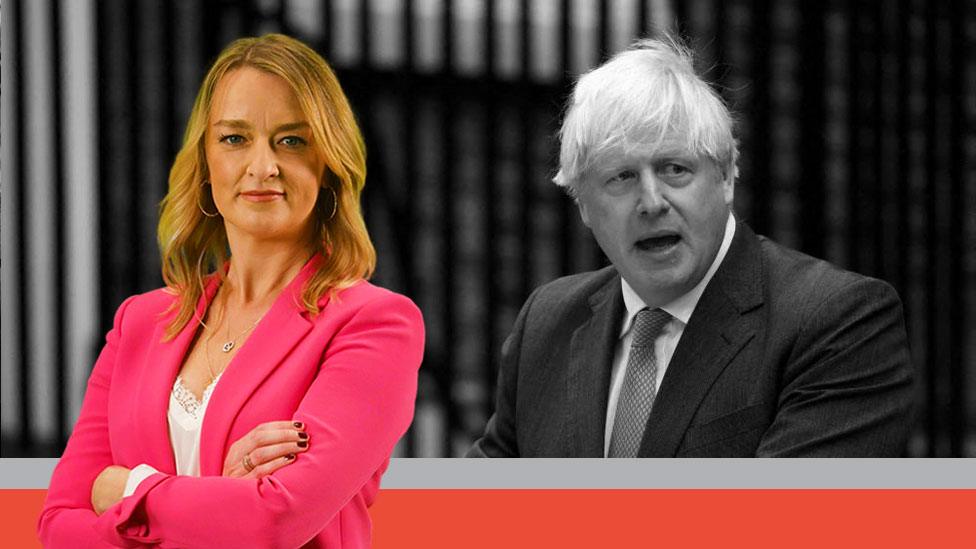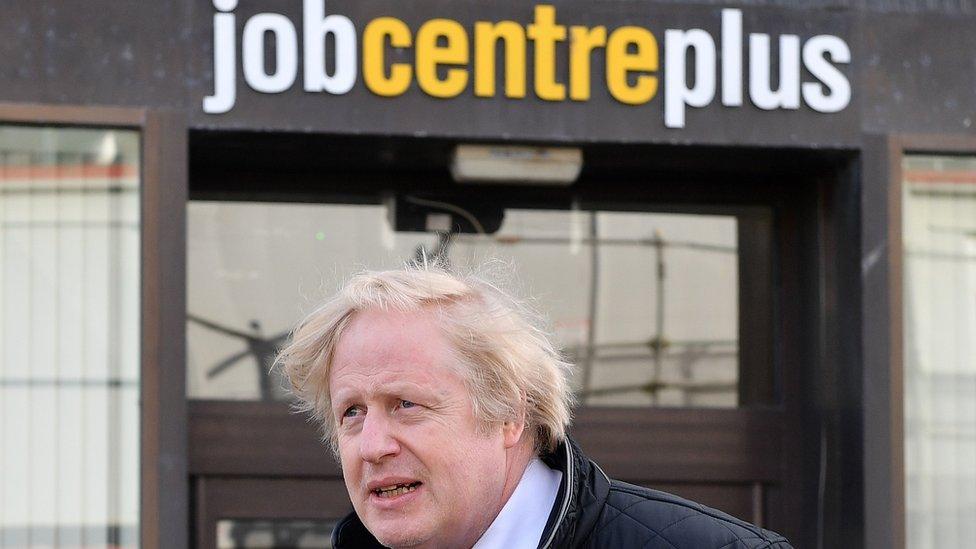Boris Johnson: Laura Kuenssberg on the facts, farce and his future
- Published

Let's start with some facts.
Boris Johnson had to leave Downing Street last summer because a majority of his Conservative colleagues thought he was doing more harm than good.
Now a committee of MPs is set to judge he didn't tell the truth. That committee is made up mainly of Tory MPs. The former PM has faced the same procedure as other MPs that get into trouble. And while Mr Johnson claims he has been "forced out", remember he has chosen to quit before we even see the black and white of their verdict.
It is also a fact there are some Conservatives who begrudge him his success. It is also true that during his last few months in No 10 there were internal enemies trying to force him out.
But to dress that up as a grand conspiracy is, candidly, a stretch. One of those who knows him best told me his resignation announcement was "1,000 words that tell you everything about Johnson's mindset - it's your fault not mine".
Rather than confront what has happened or try to defend himself from the judgement that is coming, Boris Johnson made a political choice this week not to stay and fight.
As ever, the line between farce and tragedy is skinny. While most of the headlines screamed of the shock, the former prime minister's exit from Parliament is entirely on brand.
Watch: Boris Johnson's political career... in 72 seconds
The timing on a Friday was unexpected, but no surprise. He never much liked Parliament anyway, even though he managed to find a gong for the Commons' hairdresser.
The idea he would savour being a humble backbencher asking questions about cash for the local hospital or appearing at school fetes was for the birds. And if the Privileges Committee's findings are as savage as expected he would have faced a by-election.
Clues from his track record tell us there is little chance he would have fought if he hadn't been sure he could win. He pulled out of the Tory leadership race in 2016 when Michael Gove's move blew up his status as front-runner.
He didn't run in 2022 despite a dash back from the Caribbean and fevered claims that he had enough support. One former cabinet ally says he is "more calculating than people think and this will have been a calculation - if he thought he would win the by-election he would stay". To win and lose does not match brand Boris. To leave like this absolutely does.
The power of his personality - frankly his fame - means he leaves behind some devastated colleagues and a strand of the public who believe he has been hard done by.
One former cabinet minister says: "The party wounded itself when it defenestrated Boris and continues to bleed."
Some of his hard-core supporters left on the backbenches say his exit is a sad day for democracy and - with some justification believe his leadership is what secured their seats, particularly in parts of the country where the Tories could never have dreamt of doing well before.
Some of his loyal backers do feel like he is the great hero in a tragedy, cast aside unfairly in an epic drama, undone by those who envy his talents.
His exit is arguably a tragedy for those who genuinely believed in and adored him. And there is a political tragedy for the Conservative Party, which many MPs privately believe squandered a once in a generation majority.
2019 gave it one of those rare chances to make radical changes to the country, and while many believe it was thrown away by mismanagement and mistakes, there was of course the unexpected horror of the Covid pandemic too.
For those who deplore Boris Johnson, there is a different kind of tragedy, the damage they believe he did to the UK's reputation. And several of those who have been close to him over the years identify a fourth element of the mess - the fact they believe it was never going to end well.
In the Greek tragedies so beloved of Mr Johnson himself, fate, and inevitability plays an important role. One of them says: "Boris is a genuine tragedy. This was all inevitable. We knew how it would play out, but we are still surprised and shocked about how dreadful it is. All our hard work pissed away."

Watch live on BBC One, BBC iPlayer, BBC News and streaming from 09:00 BST this Sunday, 11 June

So what happens next? Some MPs are actually cock-a-hoop despite the colossal mess. One tells me: "The man-baby has gone - so pleased!"
But allies talk up his chances of running for another seat some time. One former senior minister tells me "the question is does he plan to get another seat or even Mid-Beds?" - the constituency his close ally and former Culture Secretary Nadine Dorries has just left.
Another former cabinet minister says: "It would be very unwise for him to run again. He has a vociferous 20% in the party who like him but 80% don't. If he ran in a by-election the Lib Dems would murder him."
Would party HQ even let that happen? Prime Minister Rishi Sunak has changed the personnel in charge there. One senior figure pours a bucket of freezing water over the idea telling me: "Boris died today."
What is not clear yet is whether as that MP suggests the manner of his departure could "generate so much unrest I fear there will be an election much sooner than thought".
Mr Johnson has thrown grenades at No 10 - not just the committee that has judged him - suggesting Mr Sunak is not running a "proper Conservative" government.
One former ally says the ex-PM has "gone full circle, returning to his political home - a hut across the water where he can now lob rocks without any sense of responsibility or accountability - and that is ultimately very dangerous for his party and Sunak".

Four times Johnson bounced back
In 1987, Boris Johnson was fired by The Times for falsifying a quote - but was hired the following year by The Daily Telegraph, as the paper's Brussels correspondent
In 2004, he was fired as the Conservatives' shadow arts minister for lying about an affair - but was back on the front bench a year later
In 2016, he pulled out of his first bid to be Conservative leader and prime minister after his close friend Michael Gove launched a rival bid - but he made a surprise comeback as foreign secretary under eventual winner Theresa May
In 2018, he quit Mrs May's cabinet in protest at her Brexit deal, only to return as leader of the party the following year, going on to win a huge majority at a general election

But if Boris Johnson is unlikely to run for Parliament again, and is happy to dangle the prospect of a return, what else might he do with his time?
You'll find plenty of people in Westminster chattering that he'll return to his first love - writing - but might there be something bigger?
By chance his old newspaper the Telegraph has just come up for sale and - by chance - its former editor Will Lewis has just been made a knight by Mr Johnson. Is there, by chance, the possibility they might be part of a bid to take it over?
It's been suggested to me that is in fact something that has been discussed. It's no secret that Mr Lewis - now Sir Will - would be keen to take it on.
He advised Mr Johnson in No 10 sometimes and the two men worked together at the Telegraph when the former PM was its star columnist who attracted extra subscribers each week.
Going back as a columnist would be one thing for Mr Johnson and not all that surprising. But for him to take a bigger role - as one source whispers, the editor - might be the Conservatives' worst nightmare.
I'm told that conversations are only at the stage of ideas being scribbled down on paper. A formal sale process, let alone any decisions about actual bids, is a long way off.
But I can't help wondering, what would the consequences be for Downing Street and the Conservatives if their most loyal backer in the press gave a major role to Mr Sunak's bitter rival? Could the next twist in the Boris Johnson story be even wilder than the last? Perhaps.

What will be Boris Johnson's next job - running the Telegraph newspapers?
Some of those who have worked alongside him believe it is more likely to be "terminal Boris". A former ally says "he was obviously once someone with exceptional skills, who came so far, and did so much in the face of incredible opposition".
But they say, perhaps in sorrow and in anger: "His career ends with him alone, a victim of his utter inability to tell the truth to anyone, including himself."
Maybe he will fade into obscurity. Perhaps he'll be back in Parliament one day. He might make millions speaking and writing or become Rishi Sunak's most powerful opposition.
But his name is now on the list of those unprovable political "what ifs' so furiously and perpetually debated by political nerds.
What if Mrs Thatcher hadn't been forced out? What if Tony Blair hadn't invaded Iraq? What if Boris Johnson had given a different answer in the Commons when he was first asked what happened under his roof during the Covid lockdowns?
We will never know. But what we do know this weekend is that one era is over. We know Boris Johnson had huge potential to create, but also to destroy - his extraordinary majority, his reputation, and the party he led too.
He must now decide what to do with the power that he still retains. And his old party must decide how much attention it wants to pay.
